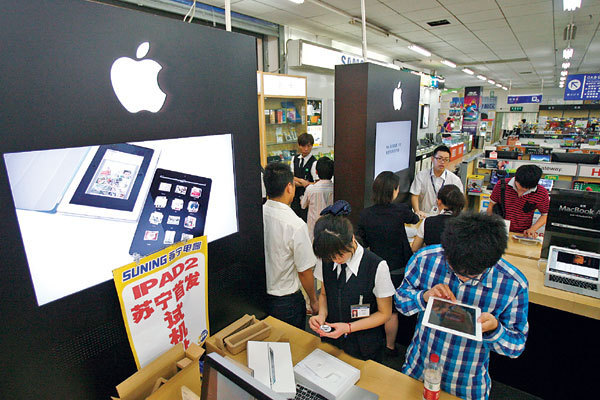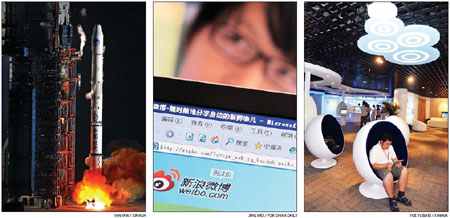|
From the Beijing-Shanghai high-speed train to the incredible reach of Sina Weibo, China's contribution to the range of science-based inventions evolved in 2011, the world over, was noteworthy, says Eric Jou
From the devastating earthquake and tsunami in Japan to the death of the tech giant Steve Jobs, 2011 felt like a year of losses, but this rollercoaster of a year also produced a few technological wonders that are likely to change our lives forever.
Here's the list then, in no specific order:
The iPad 2
At first glance this looks like a slimmer version of the Apples iPad with cameras in the front and rear, but the iPad 2 is, in fact, much more.
 |
|
Customers purchase iPad 2 tablet computers at electronics retailer Suning's store in Wuhan, capital of Central China's Hubei province, on May 6, 2011. Provided to China Daily
|
One could say there's nothing new about the iPad 2. Android tablets had front and rear facing cameras and dual core processors. From a non-Apple fan perspective the iPad 2 was just a refresh of the iPad. But its impact is much more than what meets the eye. More power and cameras make the iPad 2 a much more versatile unit, capable of video conferencing, video editing, and hi-definition gaming - all on the go.
Besides, the release of the iPad 2 brought down the price of the original iPad, making it more accessible to users interested in tablet computing.
In 2012, it is perfectly normal to see someone traveling on Line 1 of the Beijing metro watching a movie on his/her iPad, or iPad 2.
Sina Weibo
When Sina's micro blog service, Weibo, opened late in 2009, it looked like a Chinese version of Twitter (launched in 2006).
But 2011 was the year of weibo, the Chinese micro-blogging service took off in a way that couldn't be foreseen. The news of the Wenzhou train crash in July was broken on Weibo, which also helped bring the Guo Meimei scandal to light.
Weibo served as a mix of Facebook and Twitter on the Chinese Internet. It changed the way young people interacted with each other, the way business enterprises advertised and dealt with public grievances. It also changed the way the public gathered and processed information, and ultimately how they expressed themselves online.
According to iResearch, Sina Weibo commanded more than 56.5 percent of the active Internet user market share in China between March 30, 2010 and March 30, 2011. But then there is no telling how long weibo will reign, especially with the new real-name registration regulations coming into effect.
High-speed train
Traveling from Beijing to Shanghai by land without having to spend a day on board is now a reality.
When the Beijing to Shanghai High Speed Railway opened last June, it seemed rife with problems.
Now that the initial glitches are firmly in the past, it's hard to imagine traveling between the political and financial capitals of China without considering the high- speed train as an option.
Having reduced travel time by half, the Beijing-Shanghai High Speed Railway has opened the doors for similar experiments.
AIDS vaccine
Researchers at the University of Western Ontario have developed the first US Federal Drug Administration approved HIV/AIDS vaccine for human clinical trials.
Called SAV001, the vaccine is the first of its kind, and possibly the biggest scientific invention in the last 30 years.
More than 28 million people have died of HIV/AIDS worldwide since the 1980s. In China the number of people living with HIV/AIDS is expected to have reached 780,000. About 88,000 people have died from the disease since 1985, when the first case was discovered in the country.
Should SAV001's clinical trials prove successful, we may see public vaccinations in less than five years.
Cloud computing
Cloud computing has been in practice for quite a while now. The story of conducting calculations on super computers halfway around the world by just inputting data and sending it over via the Internet isn't new. Cloud has been affecting our lives since the time the earliest e-mail service providers such as Hotmail, Gmail, and Yahoo arrived on the scene.
But cloud is changing. It's become more mainstream, dynamic and flexible than just simple e-mail. In 2011 we saw the launch of two major cloud-based services offered by two of the biggest tech companies in the world, Apple and Microsoft.
Apple's offering, the iCloud, is a media server accessible anywhere in the world. Microsoft, on the other hand, offers productivity anywhere in the form of Office 365. With new iPads and iPhones offering users the option of signing onto cloud, this could have a bigger impact once it truly catches on.
 |
|
Left: Carrying a satellite - the 10th among China's indigenous global navigation and positioning network, known as Beidou - a Long March III-A rocket takes off from a base in Southwest China's Sichuan province, on Dec 2, 2011. The Beidou network will be completed in 2020, with 30 satellites orbiting the Earth.
Middle: The official website of Sina Weibo displayed on a computer screen in Shanghai on April 11, 2011.
Right: The newly-launched Tianjin-based national digital publishing cloud computing base on Aug 29, 2011.
|
Beidou
The US Global Positioning System (GPS) has become much more than just a mapping tool. It now determines social behavior. For instance, interacting through phone apps might give away one's location to friends and families, just as it would help point one to the coolest bars and restaurants in a city.
Beidou, China's entry into the Global Positioning Satellite club, is stated to be more accurate than GPS and compatible with all GPS devices. It could make traveling through China totally hassle-free.
The arrival of Beidou also signifies less dependence on and more competition with the traditionally American GPS system.
Tiangong-1
The successful launch of the Tiangong-1 is both a significant achievement for China and space travel in general. Planned as a test bed for China's future space station, the Tiangong-1 is meant to explore what man might do in space.
Launched into space on Sept 29, the Tiangong-1, which translates in Chinese as Heavenly Palace 1, is expected to be the first step toward China's ambition to build a modular space station, made up of multiple interlocking parts, in keeping with international standards.
Tiangong-1 is currently orbiting the Earth and is expected to be visited by manned missions in 2012.
Android 4.0
Google's Android operating system is currently the world's leading mobile operating system, still growing at an extraordinary pace, and in China it's no different.
Google's open-sourced operating system, called Desert, didn't really take off until version 2.3 Gingerbread, but Android, for all its virtues, has always felt like an incomplete operating system.
In 2011 Google changed all that with two major releases, Android 3.0 Honeycomb and Android 4.0 Ice Cream Sandwich. 3.0 was an operating system that Google had in mind for Android tablets. It was a tablet-based operating system, meant to compete with the iPad. Android 4.0 took a different approach; it merged the tablet and phone operating systems into one.
Android 4.0 is the first of its kind that looks and feels like a complete operating system, as well as a real iOS competitor. Android 4.0 also introduced features - such as facial recognition locks and near field communication payments - that might soon be seen in every smart phone.
|